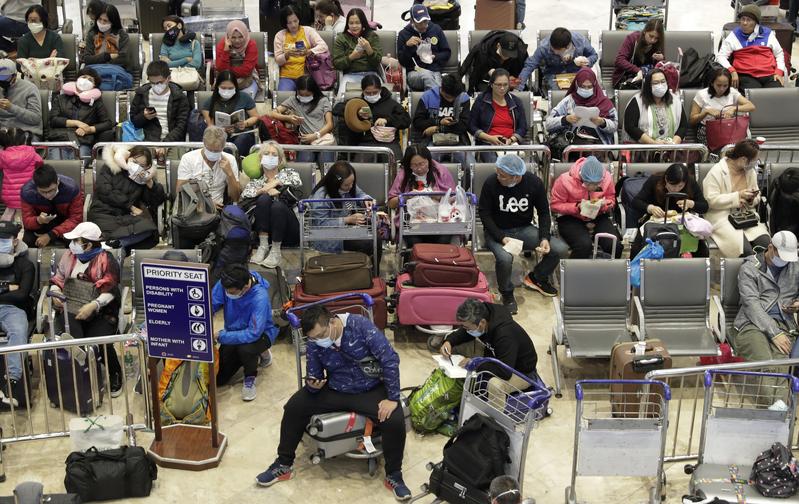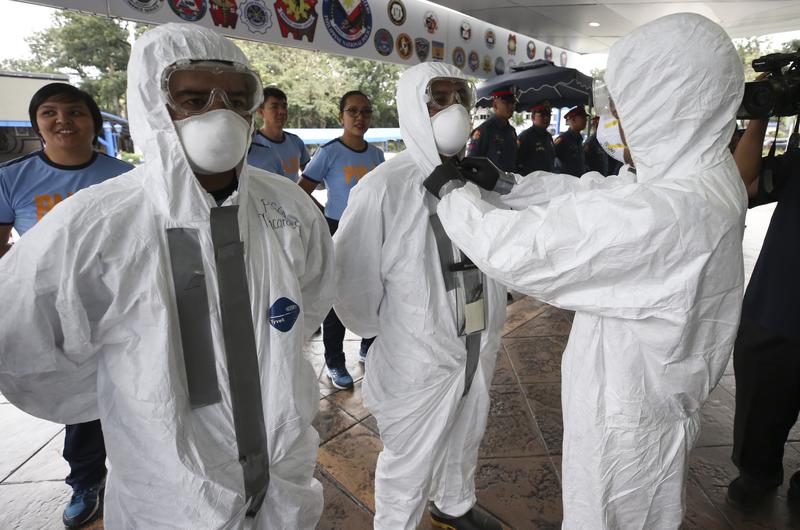 Passengers, some wearing protective masks, wait for their flights at the Manila's international airport Philippines on Feb 3, 2020. Philippine President Rodrigo Duterte has approved a temporary ban on all travellers, except Filipinos, from China and its autonomous regions. Precautionary measures have been tightened around the country following the report of the first death of a new virus outside of China. (AARON FAVILA / AP)
Passengers, some wearing protective masks, wait for their flights at the Manila's international airport Philippines on Feb 3, 2020. Philippine President Rodrigo Duterte has approved a temporary ban on all travellers, except Filipinos, from China and its autonomous regions. Precautionary measures have been tightened around the country following the report of the first death of a new virus outside of China. (AARON FAVILA / AP)
The temporary travel ban of the Philippines of all travelers coming from China has caused problems for Filipino workers in the country and other concerns at home.
The country imposed the ban effective on Monday after a Chinese tourist died in Manila a day before, the first novel coronavirus related loss of life outside China
The country imposed the ban effective on Monday after a Chinese tourist died in Manila a day before, the first novel coronavirus related loss of life outside China.
Philippine Health Secretary Francisco Duque said on Sunday (Feb 2) that a 44-year-old Chinese male from Wuhan, who travelled to the Philippines last month, has died from nCoV. He was also the companion of the previously confirmed 38-year-old Chinese female. They were both admitted for at the San Lazaro hospital in the Philippine capital.
The Philippine government has likewise banned its citizens from traveling to the Chinese mainland, Hong Kong and Macao.
Some of these workers went back to the Philippines during the Chinese New Year holiday. But these workers are now stuck in Manila’s airport, following the enforcement of the travel ban.
There are roughly 200,000 Filipinos working in the Chinese mainland, Hong Kong and Macao.
A thirty-something Filipino architect in Hong Kong who declined to be identified said his helper wasn’t able to fly out of Manila because of the ban.
He’s still trying to rebook the helper’s flight. He is also hoping that the Philippine government will exclude Filipino citizens with valid work permit from the travel ban.
 In this handout photo provided by the Philippine National Police Public Information Office, police officers arrange their protective suits during a demonstration of their capabilities at Camp Crame in Manila, Philippines, Feb 3, 2020. The group said that they are prepared to help combat the spread of the new virus in the country and assist in repatriation efforts for Filipinos in Wuhan and the rest of China's Hubei province. Philippine President Rodrigo Duterte has approved a temporary ban on all travelers, except Filipinos, from China and its autonomous regions. (PHILIPPINE NATIONAL POLICE - PIO VIA AP)
In this handout photo provided by the Philippine National Police Public Information Office, police officers arrange their protective suits during a demonstration of their capabilities at Camp Crame in Manila, Philippines, Feb 3, 2020. The group said that they are prepared to help combat the spread of the new virus in the country and assist in repatriation efforts for Filipinos in Wuhan and the rest of China's Hubei province. Philippine President Rodrigo Duterte has approved a temporary ban on all travelers, except Filipinos, from China and its autonomous regions. (PHILIPPINE NATIONAL POLICE - PIO VIA AP)
Report of the first novel coronavirus related outside China raises concerns if the Philippines has the resources and capability to manage a possible outbreak.
Mario Panaligan, vice president of the Philippine College of Physicians, said he welcomed the temporary ban and how it would help protect Filipinos amid the threat of nCoV.
ALSO READ: Asians complain of virus-related bias
“This is the containment phase. What we know is that many individuals are being monitored because of the exposure and risk of the novel coronavirus ,” Panaligan said.
Panaligan is also a member of the Inter-agency Task Force for the Management of Emerging Infectious Diseases. The task force, which is composed of representatives from various government agencies and the private sector, recommended the travel ban.
“We have to prevent another death (from nCoV) and to control the spread of the virus,” he said.
Panaligan said one of the most difficult tasks for public officials and health professionals is to calm down the widespread anxiety felt by most Filipinos. He cited the panic buying of face masks and alcogel, and also the spread of fake news and false information that’s causing more problems.
He instead advises Filipinos to follow the advice of the Department of Health, maintain basic hygienic practices and use their face masks properly.
The Department of Health said on Monday’s (Feb 3) press briefing that 80 people are under observation for the nCoV.
READ MORE: Wuhan suspends immigration administration services
Reports of the first virus-related fatality and the subsequent travel ban have immediately depressed market sentiment. The Philippine Stock Exchange closed Monday’s trade down 63.76 points.
“It is sending a lot of negative vibes to the market,” said Justino Bernardo Calaycay, research head of Manila-based brokerage Philstocks Financial Inc.
Calaycay expects the tourism sector to suffer most from the fears caused by nCoV, with both local and foreign tourists postponing their travel plans.


